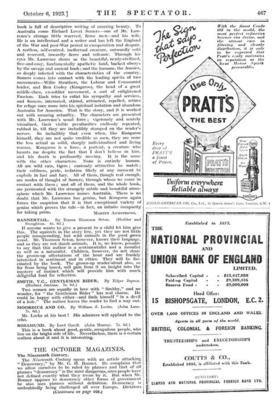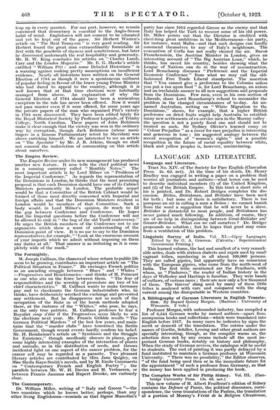THE OCTOBER MAGAZINES.
The Nineteenth Century.
The Nineteenth Century opens with an article attacking " Democracy," by Mr. G. H. Bonner. He complains that we allow ourselves to be ruled by phrases and that of all phrases "democracy" is the most dangerous, since people have not defined exactly what they mean by it. But when Mr. Bonner opposes to democracy other forms of government he also uses phrases without definition. Democracy is undoubtedly being challenged all over Europe. Dictators Wontinuea on page 468.) leap up in every quarter. For our part, however, we remain convinced that democracy is essential to the Anglo-Saxon habit of mind. Englishmen will not consent to be educated and yet be kept out of the game. Sir Herbert Warren's article on " The Real Tennyson " is very good reading. Sir Herbert found the great man extraordinarily formidable at first with the gaucherie of shyness and sensitiveness, but later he discovered underneath the real hospitality and generosity. Mr. R. W. King concludes his articles on " Charles Lamb, Cary and the London Magazine." Mr. E. G. Hawke's article entitled " William Pitt : and some Deluded Historians " is a warning against making pretty assumptions on insufficient evidence. Nearly all historians have written on the General Election of 1784 as though it were a spontaneous outburst of popular feeling in favour of the brave young Prime Minister who had dared to appeal to the country, although it is well known that at that time elections were habitually managed from above. An explanation of why the General Election of 1784 should have been a miraculous exception to the rule has never been offered. Now it would not pass muster even if it were offered, for some years ago the private papers of the man who organized Pitt's victory in 1784 were discovered. They have been edited lately for the Royal Historical Society by Professor Laprade, of Trinity College, North Carolina. These papers of John Robinson make it clear enough that the victory was won in the ordinary way by corruption, though Jack Robinson (whose name lingers in a famous Parliamentary retort by Sheridan) was above enriching himself. We are interested to see an article on " The Spectator " by Mr. J. B. Atkins, though we shall not commit the indiscretion of commenting on this article about ourselves.











































 Previous page
Previous page